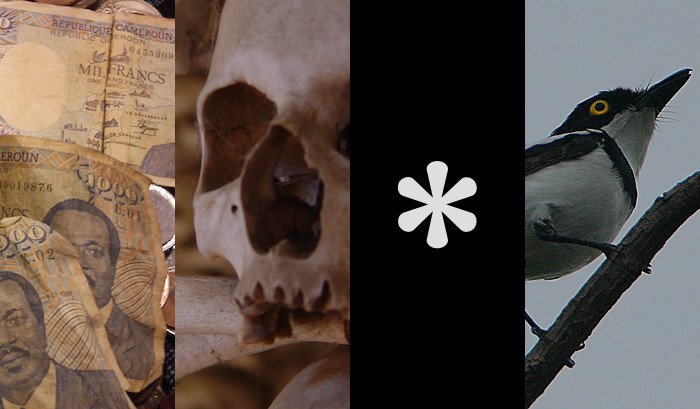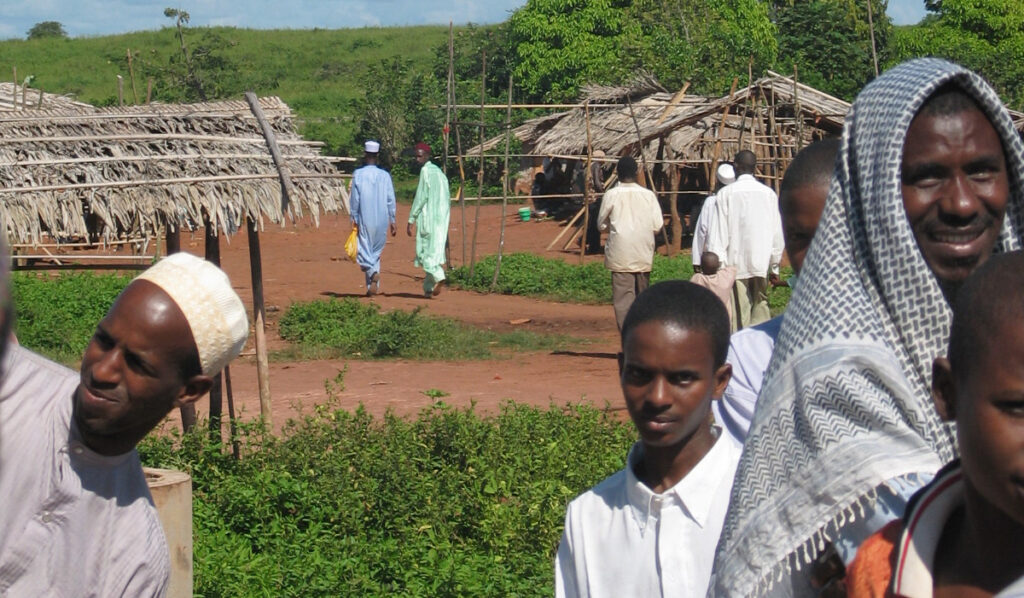In northern Cameroon, there exists a belief in a particular kind of cannibal witch. Each such witch has a bird living in their butt that crawls out to eat other people through their butts. It’s weird, wild, creepy, deeply intertwined with local values systems, and super gameable. Also, I’m going to alternate between clinical language and schoolboy language, and I’m not even the least bit sorry.
This post is brought to you by beloved Patreon backer Arthur Brown. Thanks for helping keep the lights on! If you want to help keep this blog going alongside Arthur, head over to the Patreon page – and thank you!

Image credit (L to R): TheBillBandTheory, Michael Bacina, Steve Garvie. Released under a CC BY-SA 2.0 and 4.0 license.
This post is drawn from data gathered by Helen Regis, who worked in the northern Cameroonian village of Domaayo (not its real name)in the 1990s. Domaayo is an exclusively Fulani settlement. The Fulani (also called Fula, Fulbe, and Peul) are a Muslim ethnic group who live across West Africa. They are nowhere the majority group, yet live across such broad territory that they’re one of the largest ethnic groups in West Africa. In the nineteenth century, Fulani jihadis carved out several Muslim states just in time to be crushed by European powers pressing inwards from the sea. In the Fulani identity, the archetypal community is nomadic and raises cattle. This self-image creates anxiety for the people of Domaayo, who live a settled existence growing millet for food and onions for export.
One of the chief Fulani virtues is self-control. You are not to complain of hunger, thirst, or illness. If you have a guest over, they’re liable to rejigger your fire so it fills your home with smoke, just so the two of you can have a conversation without acknowledging how unpleasant the smoke is. Maybe one of you will even cave and have to step outside, thereby losing this unspoken competition. If a kid catches malaria, her parents coach her in what she has to say to well-wishers, no matter how close to death she feels: “I’m feeling much better now, thanks be to God.”
A good monster plays on the subject’s fears and anxieties. Victorian and modern vampire stories target our anxieties over sexual impropriety, especially by women. Godzilla preyed on Japan’s anxieties about nuclear weapons. We should not be surprised, then, that the Fulani of Domaayo have a monster that preys on their anxieties about losing self-control, about consuming less meat than they ‘ought’, and about the changes produced by joining the cash economy (primarily through the onion market). I present to you the mistiriijo.

Image credit: Amca-ja. Released under a CC BY-SA 3.0 license.
Mistiriijo are cannibal witches who pose as normal, God-fearing people. Anyone could secretly be a mistiriijo. Each witch has a bird familiar who lives in their rectum. It is this bird that does the killing. While the witch goes out and interacts with people, the bird (a sondu mistirii’en) consumes the flesh of its victim through the victim’s anus. Then the bird flies back to the mistiriijo and crawls back up the witch’s anus. This is an unnatural inversion of the direction of food. It’s also gross and weird because buttholes, right? The process leaves no mark on the afflicted, and does not take up any of the mistiriijo’s time.
So how can you tell if an illness is the result of a sondu mistirii’en sucking your intestines out through your anus? Sorcerers know a medicine that, if placed near a mistiriijo’s victim, will cause the victim to rise. That identifies the nature of the problem. The next step is to wait for the bird to come back. You can tell the sondu mistirii’en from a normal bird because a witch’s familiar has fire in its cloaca: the single hole birds have instead of a separate anus, urethra, and vagina. If you kill the familiar, the mistiriijo will drop down dead instantaneously.
Unlike in many witch traditions, mistiriijo do not become so voluntarily. Instead, witchcraft is contagious. One of Regis’ informers told her about a family of mistiriijo in a nearby village. The wife came from far off. In sharing food with her husband, he became infected, succumbed, and became a mistiriijo. The same happened to their children. Whether you become infected with the mistiriijo curse is outside your control – though you should probably be careful about whom you marry. That said, whether you succumb to the infection and become a cannibal witch is a question of your self-control. Theoretically, someone with strong Fulani self-control could be infected but live a normal life without succumbing and becoming a witch.

Image credit: Steve Garvie. Released under a CC BY-SA 2.0 license.
Thus, the mistiriijo strikes at a Fulani fear that traditional values of self-control are degrading. That fear is also attached to anxieties about the postcolonial economy. Cameroon privatized many government services during the study period at the behest of the World Bank. For folks who get access to cash primarily by selling onions, basic services (like anti-malarial drugs) are now out of reach. Similarly, folks are aware of the goods available in the global marketplace, yet have no chance of accessing them. This, people fear, generates a boundless hunger for more that overrides traditional self-control.
For the Fulani of Domaayo, the connection between capitalism and the mistiriijo (hunger, loss of self-control to resist succumbing to infection) is implicit. For their Hausa neighbors, it is explicit. They have a soul-eater monster much like the mistiriijo. For these Hausa, you can buy and sell witch-hood and the same desire for more drives you to buy it.
The mistiriijo also strikes at the identity of Fulani-ness. Several of Regis’ informers joked that being a mistiriijo might not be so bad. At least you’d get to eat meat all the time, like a proper, cattle-herding Fulani. Similarly, Fulani ethnic identity is bound tightly to religious identity, to the point where some folks in Domaayo weren’t born Fulani but became Fulani after converting to Islam – and adopting Fulani language, culture, and modes of dress. But belief in the mistiriijo is considered pagan or un-Islamic. And the mistiriijo preferentially targets bad Muslims. So if you believe in the mistiriijo, on some level you believe that you are exactly who it wants to eat.

Image credit (L to R): TheBillBandTheory, Michael Bacina, Steve Garvie. Released under a CC BY-SA 2.0 and 4.0 license.
With a little fictionalization, the mistiriijo is a great fit for settings that have both supernatural monsters and an emphasis on capitalism, like Shadowrun or Ultraviolet Grasslands. If people are getting hurt in a nearby town, investigating PCs might find it’s the result of the capitalist cannibal butthole bird. Catching the bird and killing it to slay the witch is only step one, though. Because mistiriijo-hood is a contagion, unless local conditions change, there will be another mistiriijo soon enough.
Smart PCs will find a way to ease the anxieties that are making folks susceptible to becoming mistiriijo. They might shore up local religious belief, find a species of livestock that folks can raise without interrupting their agricultural livelihoods, or work with the local government to find a funding source to provide free services again. The trick to making that sort of adventure enjoyable is to create a villain the PCs are working against. Maybe there’s a cultist who’s trying to degrade social values. Maybe there’s a wealthy rabbit farmer who’s jealously guarding his new stock. Maybe there’s a businessman whose unpaid taxes would fund social services for the entire village. As long as there’s a villain, the players have lots of options for how they can tackle the problem, rather than just rolling for bureaucracy.
–
Source: Fulbe Voices: Marriage, Islam, and Medicine in Northern Cameroonby Helen A. Regis (2003)






